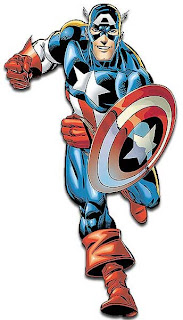Grendel is
portrayed as a character born form evil, but is he really evil, or just
misunderstood? The story of “Beowulf” starts out with King Hrothgar of Denmark.
He builds a mead-hall called Herot where his warriors can have a drink, dance
around and listen to the heroic tales of the Scops. Because of all this noise,
Grendel attacks and attacks often. Beowulf, a Geat, hears of this monster and
seeks out the challenge of destroying it. Hrothgar throws a feast in his honor
so they can lure Grendel out. Beowulf stays afterward and when Grendel comes,
fights the monster unarmed, so he can prove he is stronger. He defeats the monster
by tearing off its arm (Grendel goes back to the swamplands where he dwells to
die). Grendel’s mother wants revenge so Beowulf goes to her lair and kills her
with a sword forged for a giant. He finds Grendel’s corpse and cuts of his head
to bring back to Hrothgar. Beowulf returns home and, in time, the king and his
heir die, making Beowulf the king for fifty years. A dragon is disturbed and
attacks the Geats. Beowulf senses it is his time to die and sacrifices himself;
he kills the dragon, but in the process it kills him. Beowulf’s vassals fulfill
his wishes and burn his body in a barrow overlooking the sea. At first,
Grendel’s character is kind of vague – you don’t really know his motive. His
actions are animalistic, yet influenced by human emotions and impulses. He is
jealous, lonely and innately evil. The character of Grendel is portrayed as evil
but somewhat human. This is proven through the study of Grendel’s character and
actions through the Anglo-Saxon poem “Beowulf”.
Grendel is the
embodiment of evil. In the beginning of “Beowulf,” the author explains how
Hrothgar’s men built their mead-hall Herot, and how they have such a great time
in it. A few lines later, the author introduces Grendel. It says in lines 17
trough 21, “Grendel, who haunted the moors, the wild/ Marshes, and made his
home in a hell/ Not a hell on earth. He was spawned in that slime,/ conceived
by a pair of those monsters born/ Of Cain…” This quote proves Grendel was born
from Cain, the father of all evil beings. This is important because it explains
to the reader that Grendel is the offspring of evil itself and channels that
through man. From talking about Hrothgar and Herot, and going to introducing
Grendel as a monster born from the root of all evil, the reader can infer that
Grendel is going to attack and kill man in his merriment, making Grendel seem
truly evil.
On the inside
though, Grendel is just a lonely, jealous outcast. It is said throughout the
story that Grendel lives only with his mother at the bottom of a marsh. In the
story, this quote takes place when the narrator is describing what Grendel does
to the Danes’ mead-hall. “So
Grendel waged his lonely war,/ inflicting
constant cruelties on the people,/ atrocious
hurt. He took over Herot,/ haunted the glittering hall after dark,/ but the throne itself, the treasure-seat,/
he was kept from approaching; he was the Lord's outcast.” It is
implied that he is an outcast of that society – just as Cain is considered an
outcast. Cain is considered an outcast because he killed his brother because he
was jealous. It could be that Grendel is jealous of man and that is why he
kills so freely. Men have celebrations, drink mead, and dance and get to be
loud. However Grendel stays in his den at the bottom of a marsh, with only his
mother for company (which she is of little). Grendel is an outcast of society
who is lonely and exiled, and jealous of man.
Grendel’s actions
are animalistic because he is, in nature, a monster, yet they are influenced by
human emotions and impulses. When Grendel comes to the mead-hall and finds
Beowulf, he gets his arm torn off. “His mind was flooded with fear—but nothing/
Could take his talons and himself from that tight/ Hard grip. Grendel’s one
thought was to run/ From Beowulf, flee back to his marsh and hide there…Screams
of the Almighty’s enemy sang/ In the darkness, the horrible shrieks of pain/
And defeat, the tears torn out of Grendel’s/ Taut throat, hell’s captive caught
in the arms/ Of him who of all the men on earth was the strongest.” This quote proves
that he is an animal; he is a monster—different from man. He howls like an
animal when hurt, but his first thought when grabbed is to run and hide. He is
afraid and he knows what is coming next—he knows this is a different enemy.
Grendel is able to think and process that, like man. Even though Grendel is a
monster with an animalistic nature, his thinking is still influenced by human
impulses.
After reading
“Beowulf,” the reader can infer that Grendel character is portrayed as evil and
animalistic but with a little humanity. First of all, Grendel is considered
evil because he is born from the offspring of evil itself. Also, Grendel’s
character can be described as lonely and jealous: an outcast. Though his
actions are driven by animalistic instincts, they are influenced by human
emotions and impulses.

